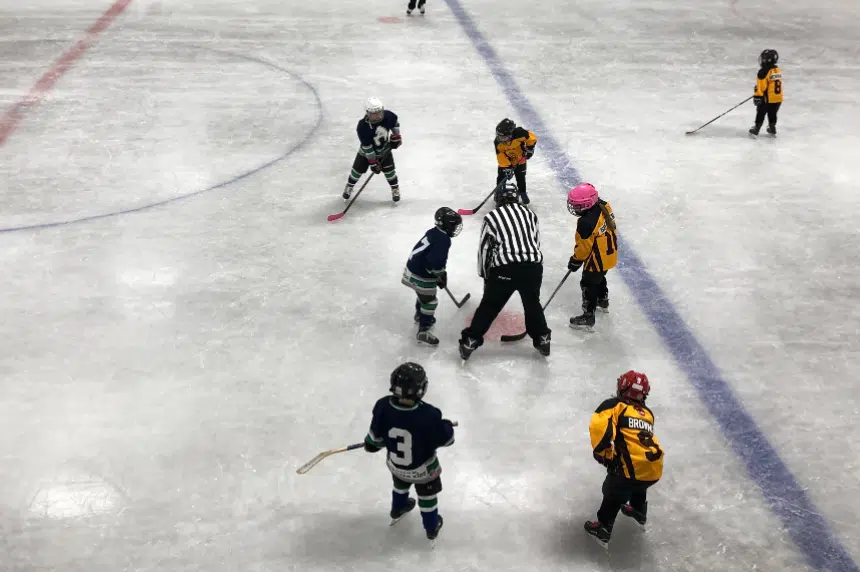The Saskatoon Minor Hockey Association is hoping to convince the city to allow athletes, coaches and officials to play games and take part in on-ice activities without wearing masks.
Masks, however, would still be required by everyone in common areas like washrooms and dressing rooms and for coaches on the benches during games.
A letter penned by SMHA executive director Kelly Boes said the amendment would make the City of Saskatoon’s mask policy in arenas consistent with what’s being done in Regina and Prince Albert, and at the University of Saskatchewan’s Merlis Belsher Place.
The request was presented to city councillors at Monday’s Planning, Development and Community Services Committee meeting.
Boes says he’s not “against” masks, but for those actively playing, it can present challenges.
“Peripheral vision (can be) impeded and blind spots created by the masks, especially when looking down at the pucks, at players’ feet and in the crease area,” Boes said. “An extra second looking for a puck while trying to make a play will make players much more vulnerable to be hit and not aware of the other player coming.
“Wearing masks in a cold building like a rink combined with hot breath leaves a disgustingly wet mask. This was a huge turnoff for our players last season.”
He said the ability to communicate could also be compromised, and it would become more challenging for referees to blow their whistles or make calls with masks on. He added it would be nice for kids to have a mental health break for 60 to 90 minutes without COVID-19 restrictions.
Letters of support were also provided to the committee from the Saskatoon Ringette Association and Skate Saskatoon.
Philip Chilibeck spoke as a representative of the University of Saskatchewan kinesiology department. He told councillors there’s info both supporting and against relaxing masking measures on the ice.
“There are a couple of studies out there that show with hockey games there has been quite a bit of transmission of COVID player to player, so the concern here is not only the infected player playing, but also the transmission of COVID to the opposing players,” he explained.
That said, he added a study from Virginia where players weren’t required to be masked — but everyone else was — and where players arrived fully dressed, where there were minimal group gatherings and where only one parent per player was present showed those strategies seemed to work well to prevent the spread of the virus.
Saskatoon city general manager Lynne LaCroix told councillors this year is going to be particularly challenging, because there is no public health order from the province like there was last year.
“At this time, every organization, every municipality, every business makes their own risk assessment and own determination of the best COVID safety protocols based on knowledge and capacity,” she explained.
“And so there will be multiple different ways of approaching COVID safety depending on the jurisdiction and depending on the organization.”
LaCroix said a report will be brought to the Governance and Priorities Committee meeting Sept. 20 which will include different “trigger levels.”
“That does align with emergency management best practices, that whenever you’re anticipating any type of emergency response, there should be triggers for that response and also triggers for when you de-escalate that response — and that they are widely understood and communicated,” she added.
City council will ultimately decide whether to allow the SMHA request.







